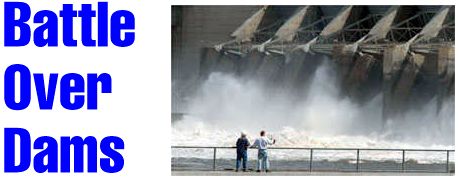forum
library
tutorial
contact

Breaching Benefits Tri-Cities, Group Says
by Les Blumenthal, Washington, D.C., bureauTri-City Herald, October 2, 1999
|
the film forum library tutorial contact |

|
Breaching Benefits Tri-Cities, Group Saysby Les Blumenthal, Washington, D.C., bureauTri-City Herald, October 2, 1999 |

WASHINGTON - The Tri-Cities would benefit most if the four lower Snake River dams are breached to help restore salmon runs, an environmental group said Friday.
In a new report, the group also concludes an investment in highways and rail could offset the loss of barge traffic on the river.
With the breaching of the dams, Lewiston, Idaho, no longer would be accessible to barges. Grain once loaded there would be shipped by truck 120 miles or so down river to the Tri-Cities, then loaded onto barges for the trip down the Columbia River to terminals in Portland, the report said.
"One of the tremendous beneficiaries of this would be the Tri-Cities," said Justin Hayes, associate director of public policy for American Rivers. "The Tri-Cities would become the largest shipping hub."
Hayes said he and other environmentalists have had a hard time understanding why so many in the Tri-Cities oppose dam breaching when they have so much to gain. Some people in the community may fear that once the Snake River dams are breached, the region will be headed down the "slippery slope" of removing the major dams on the Columbia River, he said.
"No one is advocating the removal of the Columbia River dams," Hayes said. "The salmon runs on the Hanford Reach show you can have fish and dams, just not this many dams. The Tri-Cities is listening to the wrong people, the hysterical opposition."
However, Jim Toomey, the executive director of the Port of Pasco in the Tri-Cities, said there were no guarantees dam breaching would be an economic boon to the area.
"From an economic standpoint, I'm not convinced we will be as big a winner as they say," Toomey said. "I don't share that opinion."
It is "not a foregone conclusion" that all the transportation infrastructure and grain facilities in Lewiston would just move downriver to the Tri-Cities if the dams were breached, Toomey said.
In addition, Toomey said restoring the dwindling fish runs on the Snake is more than a one-solution problem.
"We need to take a step back and say it's not fish vs. dams," he said. "A comprehensive issue requires a comprehensive solution."
The report concluded breaching the dams did not necessarily spell disaster for Eastern Washington and Idaho farmers who depend on barge traffic to get wheat to market. Investment in highways and rail service could alleviate many anticipated problems, the report said.
"Farmers who rely on the waterway to ship grain are concerned these alternatives will result in substantially higher shipping rates, potentially rendering their operations uneconomic," the report said.
"However, prudent, timely investment in rail and highway infrastructure could provide an affordable alternative to the lower Snake waterway."
Although the report did not contain any new cost figures, it noted current estimates for replacing barge transportation with truck or rail range from about $81 million to $214 million.
"In contrast to the $10 million annual navigation subsidy, the infrastructure investments proposed here would be of limited duration and capped," the report said.
"This fiscally sound transition plan would be directed at specific infrastructure upgrades, which, once completed, would require no subsidies.
"In the long term, improvements to the infrastructure will save money by eliminating the ongoing navigation subsidy."
Written by G. Edward Dickey, a former assistant secretary of the Army for civil works in the Bush administration, the report made no specific recommendations for highway or rail upgrades.
But the report said all such costs should be included in the price tag for eliminating the dams so there would be no question the money would be available.
The report also suggested government could provide loans and grants to the railroads to help them upgrade and expand their tracks and buy freight cars.
Such subsidies also could help ensure rail freight rates were competitive and not as exorbitant as farmers have feared, the report said.
At a press conference, Dickey said his report was designed to be more "conceptual" than specific. He conceded there could be economic winners and losers if the dams were breached.
"There is no requirement that everyone be made whole," he said.
Sen. Slade Gorton, R-Wash., the leading opponent of dam breaching on Capitol Hill, denounced the report.
"This is more voodoo economics from another D.C.-based special interest group which takes great pleasure in telling people and families of the Northwest how to lead their lives," Gorton said in a statement.
learn more on topics covered in the film
see the video
read the script
learn the songs
discussion forum
